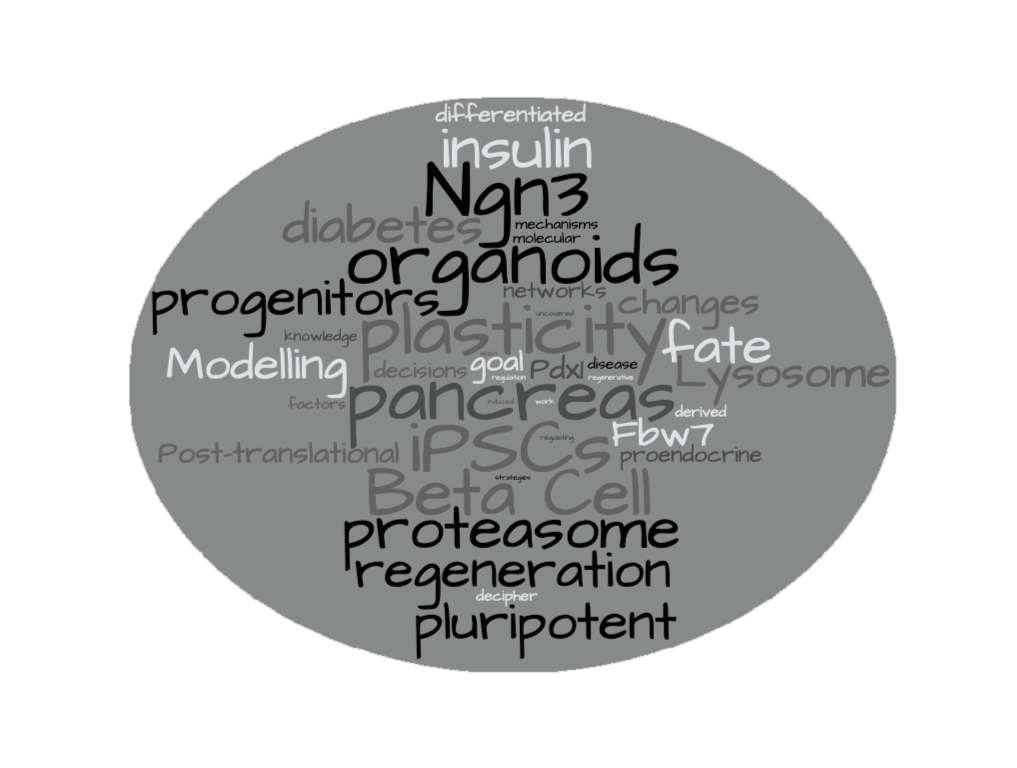In the Sancho lab, we are fascinated by the inherent plasticity of seemingly differentiated pancreatic cells and the molecular cues behind cell fate changes. Our previous work uncovered a latent capacity for regeneration in the pancreas, which could be harnessed to replace crucial insulin-producing cells lost to disease. Our main goal in the Sancho lab is to decipher the fundamental regulatory networks involved in pancreatic cell fate decisions using adult and iPSC derived organoids, and to apply this knowledge to new strategies in regenerative medicine for diabetes.
The research in the Sancho Lab is funded by:
What is our main research interest?





Searching for a place to do your PhD or PostDoc?
In the Sancho Lab we always welcome highly motivated PhD students and Postdocs with great ideas to join the team! If you share our research interests and would like to join the Sancho Lab please send your informal enquiry to rocio.sancho@kcl.ac.uk.
Our Current Research Themes
Novel molecular mechanisms regulating cell fate decisions of iPSC and adult derived pancreatic progenitors

Image: Protein expression of HNF1 (Green), CK19 (Red), DAPI (Blue). Credit: Christopher Lambert, PhD Student
Diabetes mellitus is a metabolic disorder characterised by hyperglycaemia following a loss of insulin-producing beta cells in the pancreas. Unfortunately, the pancreas is a low turnover organ with limited regenerative capacity. Therefore, we focus upon identifying the molecular mechanisms by which other pancreatic cell types can be converted into beta-like cells in order to restore glycaemic control. To address this question, we combine 3D cell culture, scRNAseq technologies and computational modelling in order to understand the molecular regulation of cell fate changes. These results will elucidate the fundamental biology of iPSC and adult progenitors plasticity and provide clues for how to unlock the regenerative capacity of pancreas progenitors for future therapies for diabetes.
Post-translational regulation of pancreas proendocrine factors

Image: Insulin (Green); Somatostatin (Red) and DAPI (blue) in iPSCs differentiated to β cells in the absence (left) or presence (right) of the inhibitor for a newly identified Ngn3 ubiquitin ligase. Credit: Teodora Manea, PhD student
In the pancreas, proendocrine factor (NGN3, PDX1) expression is necessary for the activation of genes that further determine an endocrine fate from a progenitor state, giving rise, among others, to insulin producing cells. While their role is well established, little is known about the post-translational regulation of these proendocrine factors.
Previous studies have shown that post-translational modifications targeting NGN3/PDX1 for degradation play an important role in determining how these factors can affect endocrine cell production. We are exploring newly-identified mechanisms for NGN3 and PDX1 degradation. Understanding and harnessing this machinery can represent a potential tool to improve β cell production in vitro.
Modelling diabetes using induced pluripotent stem cells (iPSCs)

Image: Pdx1 (Red); CK19 (Green); DAPI (Blue) in iPSC-derived pancreas progenitors organoids. Credit: Ana Maria Cujba, PhD student
In order to understand the molecular mechanism behind some specific types of monogenic diabetes (MODY) we use patient derived iPSCs to model beta cell differentiation in vitro. By using this approach, we have uncovered new roles of HNF1a mutations in MODY3. We used human induced pluripotent stem cells (iPSCs) derived from patients with MODY3 banked through the Human Induced Pluripotent Stem Cells Initiative (HiPSCi) and CRISPR/Cas9 technology to engineer HNF1α iPSC mutant lines and differentiated towards pancreatic fate in-vitro. In addition, we developed and characterized a novel expandable 3D-organoid system for iPSCs derived the pancreas progenitors, useful for studying MODY3 in-vitro. We conducted RNAseq and exome sequencing analysis to understand the mechanism through which the HNF1α mutation causes MODY3. Using these technologies, we discovered a novel function of HNF1a that could be responsible for the phenotype observed in MODY3 patients.

